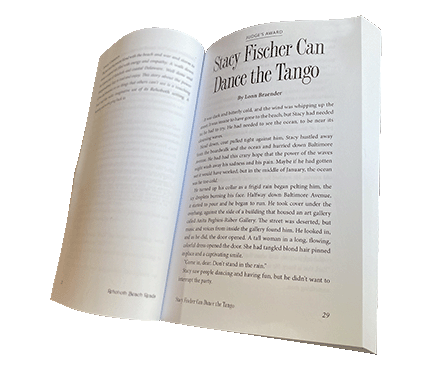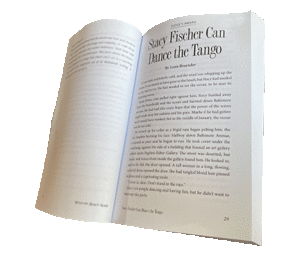An Excerpt from:
Stacy Fischer Can Dance the Tango
Judges Award
Short Story


***
A reporter is much like a detective; sometimes you have to dig up someone’s yard to find the story. I’m the literary reporter for the New York Daily, so not about to dig up a yard but digging was certain.
Daryl David, certainly a nom-de-plume, was whom I needed to dig up. Mr. David wrote a gentle book of short stories centered around Rehoboth, Delaware, called Beach Misses. It was first released by Cat & Mouse Press, a tiny publisher in Lewes. Each year, they hold the Rehoboth Beach Reads Short Story Contest, and publish the winning stories, but they also publish other books of short beach reads. So, it wasn’t a surprise the initial printing of Beach Misses was published by them.
I started by reaching out to Nancy, the owner of Cat & Mouse Press. Excited to be contacted by the New York Daily, she was happy to help. Nancy told me that Daryl David had contacted her out of the blue and pitched her Beach Misses. She was hesitant at first, but after reading the manuscript, agreed immediately. She detailed the entire process, but throughout the publishing interaction, she never once met the author. She edited the book via email, tried unsuccessfully to convince the author to change the title, and released the book in time for summer. In August, the book was reviewed by LA Tribune. The Tribune’s literary critic—a friend of mine—was born in Rehoboth and goes back each summer for a visit.
The critic loved the book, raved about it. She said it was one of the best collections of short stories she’d seen in decades and put it on her must-read list. That fall, BOI Press, the country’s second-largest publisher, bought the rights and printed ten thousand copies. Before the following summer season, the print run hit two hundred fifty thousand copies and kept climbing, making it a bestseller.
. . . . . .
An Excerpt from:
Stacy Fischer Can Dance the Tango
Judges Award
Short Story


***
It was dark and bitterly cold, and the wind was whipping up the street. It was insane to have gone to the beach, but Stacy had needed to; he had to try. He had needed to see the ocean, to be near its cleansing waves.
Head down, coat pulled tight against him, Stacy hustled away from the boardwalk and the ocean, and hurried down Baltimore Avenue. He had had this crazy hope that the power of the waves might wash away his sadness and his pain. Maybe if he had gotten wet it would have worked, but in the middle of January, the ocean was far too cold.
He turned up his collar as a frigid rain began pelting him; the icy droplets burning his face. Halfway down Baltimore Avenue, it started to pour and he began to run. He took cover under the overhang, against the side of a building that housed an art gallery called Anita Peghini-Räber Gallery. The street was deserted, but music and voices from inside the gallery found him. He looked in, and as he did, the door opened. A tall woman in a long, flowing, colorful dress opened the door. She had tangled blonde hair pinned in place and a captivating smile.
“Come in, dear. Don’t stand in the rain.”
Stacy saw people dancing and having fun, but he didn’t want to interrupt the party.
“Don’t be shy, come in.” The woman reached out, taking hold of his sleeve.
“I don’t want to intrude.” Stacy rubbed at his chin, a nervous habit his wife had tried, and failed, to stop.
“Intrude?” She had a small accent. “We’re dancing the tango; you can’t intrude.”
“I don’t dance.”
“That’s OK, come get warm. You’ll freeze out here.” Her voice was exotic. She was exotic. “I’m Anita.”
He stepped up and into a long glass porch. “Stacy, Stacy Fischer.” . . . . . .
An Excerpt from:
Stacy Fischer Can Dance the Tango
Judges Award
Short Story

***
It was dark and bitterly cold, and the wind was whipping up the street. It was insane to have gone to the beach, but Stacy had needed to; he had to try. He had needed to see the ocean, to be near its cleansing waves.
Head down, coat pulled tight against him, Stacy hustled away from the boardwalk and the ocean, and hurried down Baltimore Avenue. He had had this crazy hope that the power of the waves might wash away his sadness and his pain. Maybe if he had gotten wet it would have worked, but in the middle of January, the ocean was far too cold.
He turned up his collar as a frigid rain began pelting him; the icy droplets burning his face. Halfway down Baltimore Avenue, it started to pour and he began to run. He took cover under the overhang, against the side of a building that housed an art gallery called Anita Peghini-Räber Gallery. The street was deserted, but music and voices from inside the gallery found him. He looked in, and as he did, the door opened. A tall woman in a long, flowing, colorful dress opened the door. She had tangled blonde hair pinned in place and a captivating smile.
“Come in, dear. Don’t stand in the rain.”
Stacy saw people dancing and having fun, but he didn’t want to interrupt the party.
“Don’t be shy, come in.” The woman reached out, taking hold of his sleeve.
“I don’t want to intrude.” Stacy rubbed at his chin, a nervous habit his wife had tried, and failed, to stop.
“Intrude?” She had a small accent. “We’re dancing the tango; you can’t intrude.”
“I don’t dance.”
“That’s OK, come get warm. You’ll freeze out here.” Her voice was exotic. She was exotic. “I’m Anita.”
He stepped up and into a long glass porch. “Stacy, Stacy Fischer.” . . . . . .
